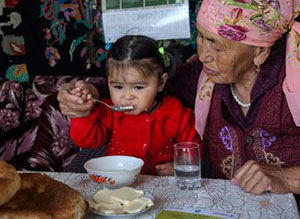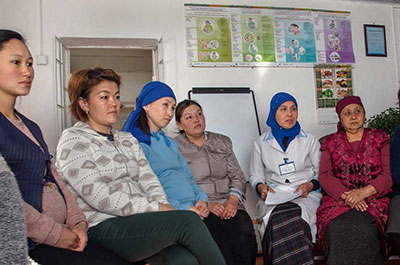Duration of Exclusive Breastfeeding is a Positive Predictor of Iron Status in 6- to 10-Month-old Infants in Rural Kenya
Maternal & Child Nutrition, 2017.
Maternal & Child Nutrition, 2017.
The 2013 Demographic and Health Survey (NDHS) for Nigeria found that infant and young child feeding (IYCF) practices remain suboptimal in Nigeria. Among other findings, only 17.4% of children under six months old are exclusively breastfeed, and only 35.3% of mothers are continuing breastfeeding at two years. Child nutrition outcomes are often poor, with the rate of wasting among children under five years old at 18.0% and the rate of stunting at 36.8%.
The Baby-Friendly Hospital Initiative (BFHI) defines global standards of optimal care for appropriate breastfeeding and mother-child bonding. Participating hospitals undergo a process of planning, training, and organizational and policy changes to achieve 10 steps.
USAID, Ministry of Health, and oblast government representatives attended the Baby-Friendly Hospital Initiative (BFHI) award ceremony for three facilities in Jalalabad on January 31, 2018. On the same day, MOH and oblast administration officials in Naryn awarded BFHI certificates to three facilities.
View the News Story here.
SPRING/Kyrgyz Republic, funded by USAID to address issues of chronic malnutrition and anemia among women and children of Kyrgyz Republic, hosted a round table event on Friday, November 17, 2017 to disseminate the findings from a series of four population-level surveys undertaken by the project over the past four years, including gains in nutrition outcome indicators.

The SPRING project is a seven-year USAID-funded Cooperative Agreement to strengthen global and country efforts to scale up high-impact nutrition practices and policies and improve maternal and child nutrition outcomes.
The doctor at a health center greets a new mother and explains to her that when a baby is born they should immediately be breastfed, and that they should only receive breastmilk until they are six months old. The grandmother of the child arrives and the doctor explains the same thing to her, emphasizing all of the good reasons for breastfeeding and assuring that the baby does not need any water or other drinks. The doctor then explains different positions for breastfeeding and helps the woman practice.

The World Health Organization recommends that all babies are exclusively breastfed for the first six months of life. In low and middle income countries, breastfeeding is a particularly powerful means of preventing malnutrition and promoting optimal physical and cognitive growth. Still, women around the world continue to face obstacles that make this practice difficult--from perceived trouble producing milk to lack of supportive workplace environments.
SPRING/Kyrgyz Republic works with media partners to develop and share videos on key nutrition messages across the country. This animated video contains key messages on the importance of exclusive breastfeeding up to six months of age.